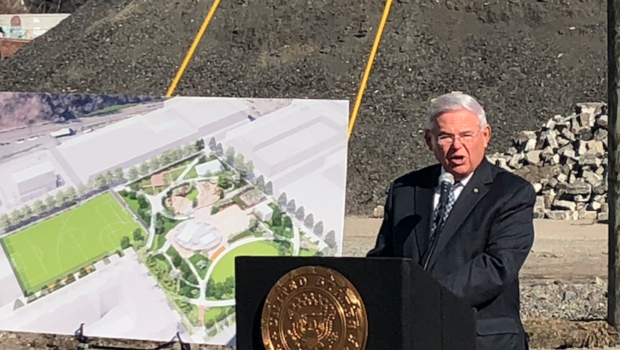
Hoboken to Receive $14 Million to Assist With Completion of Northwest Resiliency Park on Former Industrial Site
U.S. Senator Bob Menendez joined Hoboken Mayor Ravi S. Bhalla today to announce an historic $14 million worth of funding from the Federal Emergency Management Agency (FEMA) to assist with construction of the Northwest Resiliency Park.
“This ambitious, innovative project will improve the lives of Hoboken families, children and seniors by better protecting this community from flooding that is occurring more and more frequently,” said Senator Menendez. “Sandy taught us that it’s a heck of a lot more expensive to rebuild in the aftermath of destructive storms than it is prevent costly floods in the first place. That’s why I’ve been fighting to make new federal investments in forward-looking mitigation projects like the Northwest Resiliency Park. When we talk about spending taxpayer dollars wisely, investing in resilience really pays off. In fact every dollar spent on flood prevention and mitigation generates another six dollars in savings.”
The money comes in the form of a $10 million FEMA grant, which is specifically to fund construction of the park’s resiliency features—such as the above ground green infrastructure and underground water detention system that will reportedly withhold nearly two million gallons of rainwater and runoff.
“This is an historic day for the City of Hoboken,” said Mayor Bhalla. “Hoboken’s Northwest Resiliency Park isn’t just a regional or state-wide example for combating heavy flooding events, it will become an innovative model for the rest of the country. The grant we are receiving will play a critical role in funding our five-acre resiliency park that will finally provide relief to the chronic flooding that too often impacts residents in Northwest Hoboken. The infrastructure to combat heavy rain events, combined with the state-of-the-art amenities in the park, will dramatically improve the quality of life for our community.”
In conjunction with the City’s grant, a separate $4 million grant has been awarded to the North Hudson Sewerage Authority (NHSA) to fund completion of stormwater infrastructure upgrades in areas adjacent to the park. The New Jersey State Police Office of Emergency Management will administer the FEMA grants to the City of Hoboken.
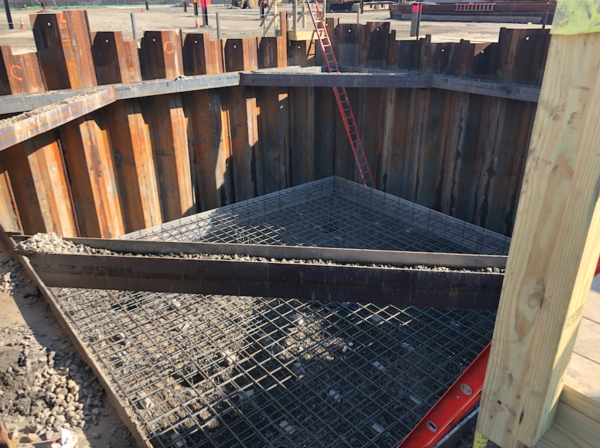
Installation of the underground water detention systems is already underway.
“Hazard mitigation is a shared responsibility requiring a whole community approach,” said New Jersey State Police Col. Patrick Callahan, in a prepared statement. “The New Jersey Office of Emergency Management will continue to work in partnership with communities throughout the State as we strive to continue this momentum of shared success.”
The award of this $14 million grant comes at a time when the City of Hoboken is facing a projected budget shortfall of $7.5 million combined with a reduction of the City’s surplus—which is expected to add up to an amount nearing $14 million. City officials have made assurances that the park will be constructed without any impact on Hoboken’s 2020 municipal budget, and that the grant money awarded today will only be used for the park project.
“As per the terms of the grant, the use of the funds is restricted to the construction of the Northwest Park and flooding infrastructure,” Hoboken City Spokesman Vijay Chaudhuri tells hMAG.
“This is incredible news for Hoboken,” said 2nd Ward Councilwoman Tiffanie Fisher, in a statement to hMAG. “Including acquisition and finance costs the price of this park is over $90 million, so this grant goes a long way to easing the financial impact of this important project. I’m thankful for Senator Menendez’s advocacy.”
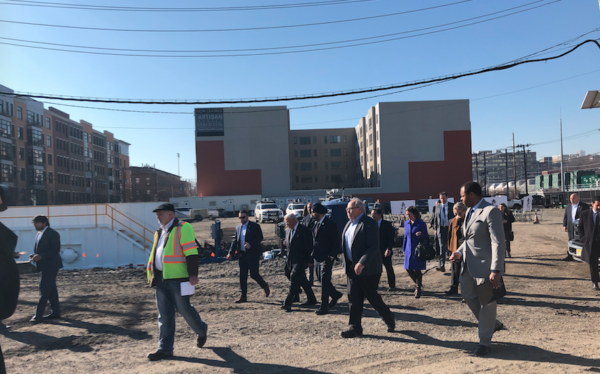
“We’re here for an exciting moment,” said Hudson County Freeholder Anthony Romano. “Growing up in Hoboken, this was always a contaminated site from the chemical companies and the constant flooding, so as a resident we’re excited and look forward to what is going to come.”
The site on which Hoboken’s new park will be located had maintained industrial operations until 2005. Upon testing the property, results indicated levels of polychlorinated biphenyls (PCBs) “between not detected and 420 parts per million (ppm),” rendering it unsafe for residential development.
Former landowner BASF proposed remediating the soil to 25 ppm, the U.S. Environmental Protection Agency’s (USEPA) criteria for “low occupancy” use. By their definition, low occupancy is an area where individuals spend less than an average of 6.7 hours per week. Both the USEPA and the New Jersey Department of Environmental Protection (NJDEP) approved BASF’s remediation plan, which was completed in November of 2016. The entire lot was then encapsulated with 6‐inch asphalt cap, and Hoboken purchased the property from BASF for $30 million, just weeks after the NJDEP issued their report on the land.
That cap has been removed in order to install the underground water detention system.
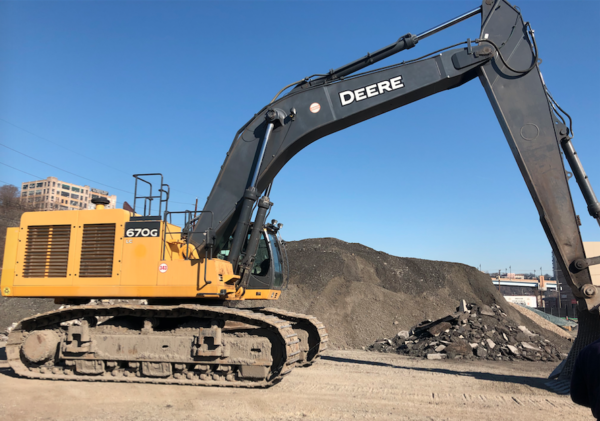
hMAG inquired as to the overall environmental safety of the project, to which Hoboken Environmental Services Director Jennifer Gonzalez responded, “We have a licensed site remediation professional who oversees the site and has overseen the design of the new cap. The new cap will be a mix of different surface treatment, whether that be pavers and concrete as well as additional vegetation and soil layers—all of which are going to meet DEP and EPA standards, so it will be safe and effective for recreation.”
Senator Menendez later returned to the podium to address that question, stating, “We aren’t pumping any water into the Hudson River that isn’t treated according to the standards as if it went to the North Hudson Sewerage Authority, period. It will be as clean as if it went through the Authority.”
Regarding the park itself, the Senator added, “We are not having any standards here that will be less than those approved by the Environmental Protection Agency and the DEP—Federal and State agencies. I don’t think the Mayor or the Council would be party to such a thing.”
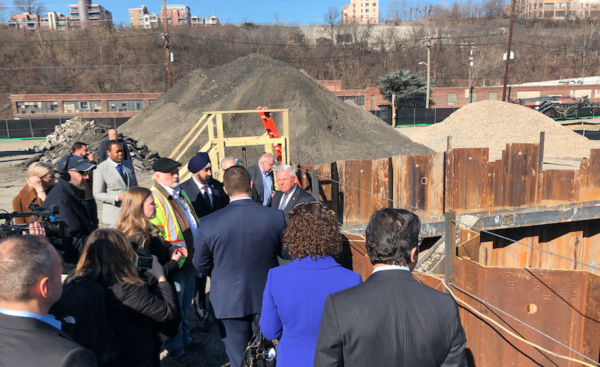
Menendez went on to assert his intimate knowledge of the issues facing the area.
“I lived here in Hoboken for a good period of time. It doesn’t take a Sandy or an Irene to face some very significant flooding. The quality of life—I believe, as someone who was living just back there on 10th & Clinton—will just be dramatically different,” said the Senator.
“It has a ripple effect in property values—it goes up, it has a ripple effect in quality of life—it gets better, it has a ripple effect in productivity—you’re not losing time in being able to get through the difficulties of the flooding.”
Menendez worked to secure the original $60 billion Sandy aid package from Congress and has been among the leading advocates for sweeping reforms to the National Flood Insurance Program (NFIP). As chair of the Sandy Task Force and the ranking member of the Senate’s housing subcommittee, he helped secure $230 million from the U.S. Department of Housing and Urban Development (HUD) to complete a bold, innovative flood resiliency project in Hoboken, Weehawken and the surrounding neighborhoods known as Hudson River Rebuild by Design (RBD).
Northwest Resiliency Park will become the most significant part of RBD’s “delay, store and discharge” strategy. The park itself will include athletic fields, open lawn space, a pavilion and shade structure, an ice skating rink, a spray water park, a variety of playground equipment for children of all ages, lowland gardens and a basketball court.
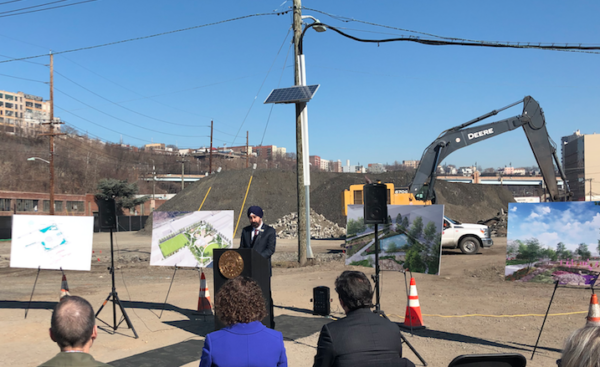
***

 Previous Article
Previous Article Next Article
Next Article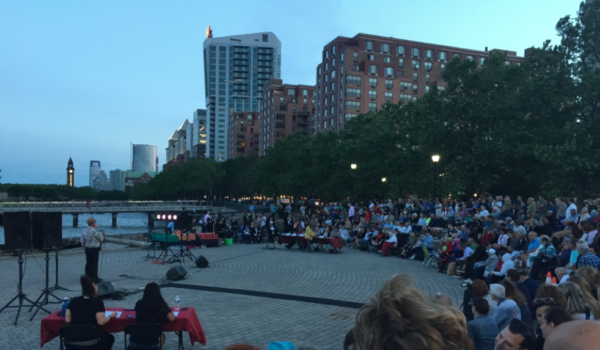 hOMES: Weekly Insight Into Hoboken and Downtown Jersey City Real Estate Trends | JUNE 23, 2017
hOMES: Weekly Insight Into Hoboken and Downtown Jersey City Real Estate Trends | JUNE 23, 2017  LOVE IS LOVE: Hoboken City Hall to Hold Vigil For Victims of Orlando Shooting
LOVE IS LOVE: Hoboken City Hall to Hold Vigil For Victims of Orlando Shooting  HOBOKEN ARTISTS STUDIO TOUR: Explore the Cultural Assets Right Next Door—SUNDAY, NOV. 6th
HOBOKEN ARTISTS STUDIO TOUR: Explore the Cultural Assets Right Next Door—SUNDAY, NOV. 6th  AFFORDABLE HOUSING: Former Hoboken Councilman Speaks Out Against Move to Exempt Developers From Mandate | OPINION
AFFORDABLE HOUSING: Former Hoboken Councilman Speaks Out Against Move to Exempt Developers From Mandate | OPINION  Hoboken Police Raid Crack Cocaine Ring After Lengthy Investigation
Hoboken Police Raid Crack Cocaine Ring After Lengthy Investigation  HOBOKEN MAYORAL RACE: C’mon In, the Water’s Warm… | EDITORIAL
HOBOKEN MAYORAL RACE: C’mon In, the Water’s Warm… | EDITORIAL 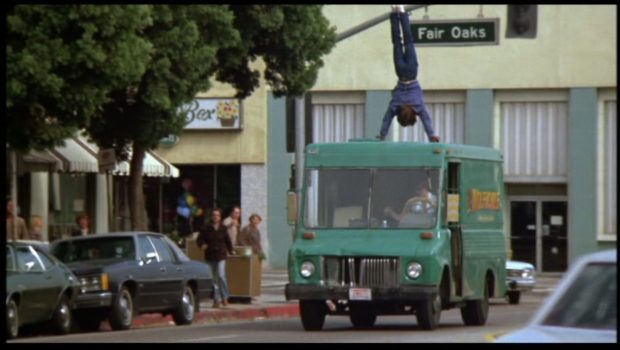 Hoboken Police Nab Driver for DWI… In a School Zone… With a Passenger On His Roof
Hoboken Police Nab Driver for DWI… In a School Zone… With a Passenger On His Roof  Hoboken Artists Studio Tour — SUNDAY
Hoboken Artists Studio Tour — SUNDAY